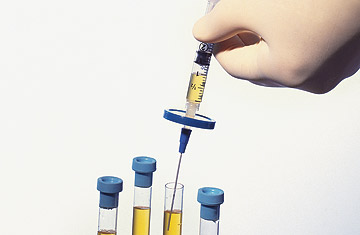
A judge ruled random teacher-testing unconstitutional.
One could argue that some people--painters, fashion models, rock stars--perform better under the influence. But other jobs should go only to the perpetually sober. We don't want our chemical-weapons handlers to be pulling a Michael Phelps on the job, which is why employees in high-risk positions are subjected to random drug tests.
But what about people who work in less perilous, if equally unpredictable, environments--say, with kids in public schools? Should teachers be randomly tested too? Yes, says Linda Lingle, GOP governor of Hawaii, where the teachers' union agreed in 2007 to negotiate the terms of a new drug-testing program in exchange for more pay. Now some Hawaii teachers are resisting, citing the cost of the tests to the schools and to their right to privacy. Teacher-testing has also become the subject of recent court cases in North Carolina and West Virginia.
But aside from the legal issues, one important question hasn't been addressed so far: Does random drug-testing actually reduce drug use?
Probably not. Research shows that drug-testing is an effective deterrent in orderly, full-immersion settings like a military base or housing for élite athletes. But several studies have shown that drug-testing doesn't work well in schools. In the biggest study to date, issued in 2003, a University of Michigan team that looked at 894 middle and high schools found that random student drug-testing tends to reduce marijuana use slightly (about 5%) but actually increase the use of other drugs (about 3%). The authors theorize that drug users may think prescription and other narcotics will be harder to detect by urinalysis, so they switch.
Even after the researchers controlled for socioeconomic differences among students and schools, they found no statistically meaningful difference in drug-use rates among kids who attended schools that randomly drug-tested and those that didn't.
Still, the behavior of kids doesn't neatly correspond to that of their teachers, who will fear losing their jobs if caught. Which leads to a more fundamental question: If we're serious about drug enforcement, why not subject every American to random testing?
One answer is the Constitution: a West Virginia judge last month declared random drug-testing of teachers to be unreasonable searches. (A North Carolina ruling that safety concerns trump teachers' right to privacy is under appeal.) The other issue is cost. In the West Virginia case, the school district would have to shell out about $37,000 a year for urine tests, which could pay for an entire teaching position.
Meanwhile, the evidence suggests that drug use among teachers is not exactly a pressing problem. In 2007, a major study by the Federal Government showed that educators rank 18th out of 19 listed professions in the use of illicit drugs. (Those who work in food service, arts, retail and "information" services--like, um, journalists--were the major offenders.) Only 4% of educators surveyed confidentially reported use of illegal drugs in the previous month--still too many, but hardly an epidemic requiring enormous expense to fix.
